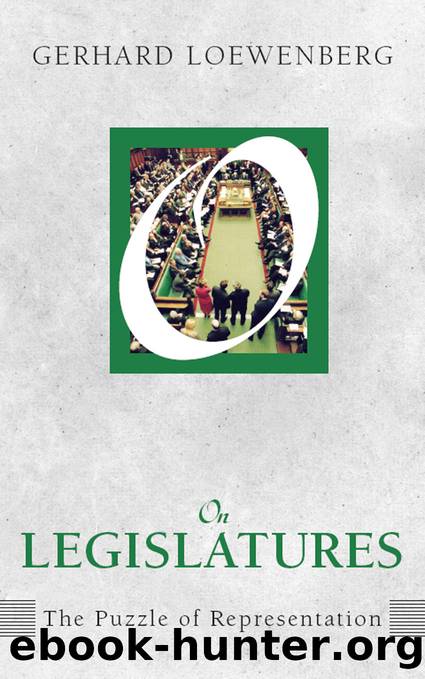On Legislatures: The Puzzle of Representation by Gerhard Loewenberg

Author:Gerhard Loewenberg [Loewenberg, Gerhard]
Language: eng
Format: epub
Tags: Political Science, General
ISBN: 9781317255147
Google: JxfvCgAAQBAJ
Publisher: Routledge
Published: 2015-11-17T11:46:35+00:00
The Capacity of Legislatures to Control the Actions of the Executive
Legislatures have been the chosen instruments of democratization because giving their members the power to make laws presumably gives them the capacity to control the executive branch of the government. But the control of government in the modern world entails more than establishing the legal norms that organize and circumscribe governmental action. It entails regulation of governmental expenditures and appointments, oversight over government decisions, and control over the discretion of the bureaucracy. The capacity of legislatures to exercise these controls varies greatly. Analysis of that capacity has used a âprincipal-agentâ concept, which I mentioned in chapter 2 in the discussion of representation; in the present case, the legislature is regarded as the âprincipalâ in this relationship and the bureaucracy as its âagent.â A cross-national analysis using this concept demonstrates that there is great institutional variation in the capacity of legislatures to control the government. All other things being equal, the legislatureâs control can be greater in presidential systems, in which the legislature is separate from the executive, than in parliamentary systems. In presidential systems legislatures can formulate detailed laws to limit bureaucratic discretion effectively. Their ability to do that depends on the level of professionalization of the legislature, its staffing levels, and the stability of its membership over time. In parliamentary systems, especially when party discipline is high and the cabinet enjoys the support of a majority party in parliament, executive autonomy is likely to be great, both because ministers who sit in parliament exercise extensive influence over the content of legislation and because they also influence its implementation. But in parliamentary systems in which government consists of a coalition of parties, legislative control is similar to that which exists in presidential systems. Furthermore, where cabinets stay in office for relatively short durationsâwhere parliamentary systems exhibit cabinet instabilityâlegislative control does not effectively limit the bureaucracy.5
The influence of legislatures over appointments, appropriations, and oversight also varies greatly. The power of the U.S. Senate to confirm approximately 1,000 presidential appointments has no counterpart elsewhere and has assumed greater importance as the Senate has made increasing use of the right of a two-fifths minority to block consideration of appointments. That right has morphed into the ability of single senators to place a âholdâ on the confirmation of appointments, a reflection of the need for unanimous agreement on agenda decisions. As a result, a new administration is often unable to fill administrative positions for many months after coming to office. Although the power to confirm appointments is specific to the U.S. Senate, other legislatures often act as the electorate for filling government positions. In twenty-five European countries, parliaments elect, or participate in the election of, the holders of five important offices: the head of state, the members of the constitutional court, the chair of the central bank, the head of the national audit office, and the ombudsperson. In this way parliaments exercise influence over how these important positions are filled, but there is little
Download
This site does not store any files on its server. We only index and link to content provided by other sites. Please contact the content providers to delete copyright contents if any and email us, we'll remove relevant links or contents immediately.
Collaborating with Parents for Early School Success : The Achieving-Behaving-Caring Program by Stephanie H. McConaughy; Pam Kay; Julie A. Welkowitz; Kim Hewitt; Martha D. Fitzgerald(896)
Entrepreneurship Education and Training: The Issue of Effectiveness by Colette Henry Frances Hill Claire Leitch(664)
Adding Value to Policy Analysis and Advice by Claudia Scott; Karen Baehler(499)
Materializing the Middle Passage by Jane Webster;(496)
Race and American Political Development by unknow(486)
Sociological Perspectives of Health and Illness by Constantinos N. Phellas(476)
American Government and Politics Today by Steffen W. Schmidt Mack C. Shelley Barbara A. Bardes(475)
Human and Global Security : An Exploration of Terms by Peter Stoett(460)
Control Of Oil - Hardback by Kayal(457)
The Disappearance of Rituals: A Topology of the Present by Byung-Chul Han(398)
Advances in Child Development and Behavior, Volume 37 by Patricia J. Bauer(395)
The Catholic Church and European State Formation, AD 1000-1500 by Jørgen Møller(388)
The World According to China by Elizabeth C. Economy(379)
Theories of Counseling and Psychotherapy: A Case Approach by Nancy L. Murdock(370)
Left Is Not Woke by Susan Neiman(366)
Application of classical statistics, logratio transformation and multifractal approaches to delineate geochemical anomalies in the Zarshuran gold district, NW Iran by unknow(362)
Turkey's Relations with the West and the Turkic Republics: The Rise and Fall of the Turkish Model by Idris Bal(352)
Cross-Cultural Child Development for Social Workers by Lena Robinson(348)
Japan's Ainu Minority in Tokyo by Mark K. Watson(330)
